Patreon MUSICARTA Premium
Scale Practice Patterns
This page is an example of how Musicarta can help you learn your scales efficiently. Revive your scale practice regime and start reaping the benefits of ‘knowing your keys’!
The first part of this module addresses key signature.The second part of the module explains scale fingering.
This material is in the key of D because it also forms part of the Musicarta Canon Project, and Pachelbel’s Canon is in the key of D major.
D major shares the same fingering pattern as the C, G, A and E scales (the 'Group One' scales). Scale practice pattern work in D major applies to all these other scales.
The bulk of the module presents a basic collection of scale practice patterns. Adding rhythm and contour to scale practice hugely multiplies its value - and enjoyability.
The scale practice patterns are presented as line-diagram ‘cues’ for note-free practice, and are intended to be used to practice scales in all other keys.
The key signature
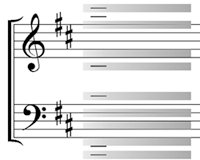 |
The black keys necessary for playing ‘in a key’ are indicated in the key signature. In D, all notes written on the lines or in the spaces shaded in the diagram above (any F or C, in fact) are played on black keys F sharp and C sharp, which replace white keys F and C. For clarity, only two sharps are shown on each clef. The rest are understood. |
This diagram shows one octave of D major scale-tones. It could be anywhere on the keyboard.

The replaced white keys F and C have been greyed out, along with the black keys you do not use. This is how the well-schooled keyboard player sees the keyboard as soon as he or she sees the two-sharp key signature.
(Note that, if a key signature shows two sharps, they are always F sharp and C sharp.)
D major scale fingering
The main reason for learning scales in keyboard playing is to learn keys. If you know your D major scale, you know what the key of D major ‘looks like’, and you will be much less likely to play wrong notes.
Here is our sample octave of D major showing which fingers play which notes. (Use keys in the middle of your keyboard if you want to experiment.)
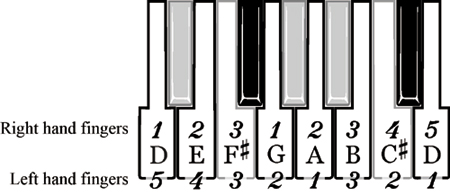
The rest of the Musicarta Scales material:
- How the sharps and flats build up;
- Key-specific Keyboard diagrams
- How to immediately name a major key from the key signature;
- Contour scale practice patterns;
- Rhythmic scale practice patterns;
- Scale-tone practice patterns
- Pentatonic scales
- Modes
..."and much more besides"... has now moved to the
Musicarta Patreon Tier One
An excellent and stimulating collection of creative keyboards repertoire and reference resources - at a very reasonable price! Check it out!
Musicarta Patreon Tier One
A Musicarta Patreon Tier One subscription is another way to get the benefit of the PentHan 01-12-20 Exercise Series. Look at what the Tier One subscription offers! (Links to series home pages.)
|
The Video Hanon - the best video version on the web! The Beat and Rhythm Workbook - go for the jugular! 'Chords 101' - an overview of essential popular-music theory. The Pyramids Variations - your fast track to 'composing at the keyboard'. 'Majestic River' piano solo - an easy chord study in eight progressive lessons. Musicarta Easy Piano Style - the new 'Play Like Enya' video pages (plus four how-to Enya solos). |
Musicarta 'LH-over style' - as applied to "Falling in Love with You". 'Greensleeves' Piano Solo - a beautiful progressive arrangement. Scales and Exercises - a stimulating collection including the 'Pentatonic Hanons' and the NEW PentHan 01-12-20 Series. Key signatures - get to grips with key signatures once and for all! Songbook - collection of easy-inter traditional repertoire melodies. |
...plus - more material going up all the time!
At only US$5.00 per month, it's a great way to give your keyboard creativity a boost! Sign up now!
To thank you for browsing Musicarta, please take advantage of the following complementary bonus material.
Scale practice patterns
The thumb-under movement, hands separately
Practice the right hand thumb-under movement three times, then complete the octave.

Practice the left hand thumb-under movement in the same way. You will play from the top.

Thumb under, hands together
The main challenge when playing scales with both hands together is that there is a third-finger-over or thumb-under movement in one hand while the other hand is playing simple 1–2–3–4–5 or 5–4–3–2–1.
This is something that needs practice. Here is a study for this challenging movement.

|
You run up and down the first five notes of the D major scale, hands together, using the actual scale fingering. The right hand practices the thumb-under and third-finger-over movement (complicated) while the left hand just plays from one side of the hand to the other (simple). |
 |
Note: You can practice the right hand on its own first if you need to.
The thumb-under/third-finger-over movements are still boxed in the MS, but the black key F sharp is not circled - you read the key signature. Both third fingers play an F sharp.
Practice until the fingering is ‘in your hand’.
|
Next, we use a similar study for the top five notes of the scale, where the left hand does the ‘complicated’ movement and the right hand is ‘simple’. Can you play that - with the right fingers!! - before you listen to the audio? |
 |
If you could - GOOD FOR YOU!! You have a skill worth nurturing - even if you're the only person who ever knows about it! Join Musicarta and let you creative flame burn bright!
|
Spend a moment or two pondering the diagram on the right, then use the diagrams below to structure your self-directed scale practice. |
 |
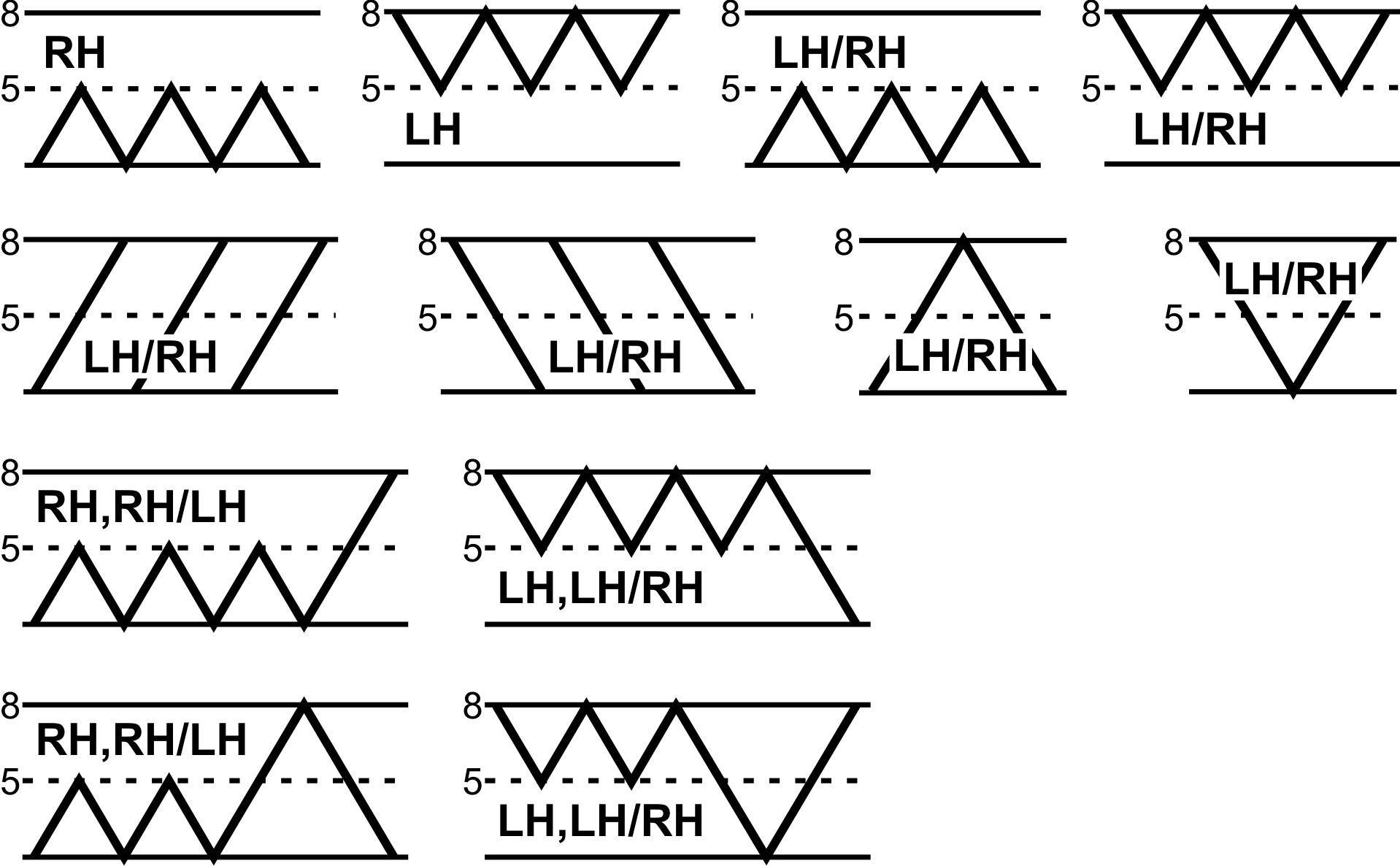
|
OUT NOW! |
THE MUSICARTA BEAT & RHYTHM WORKBOOK At last! An effective approach to keyboard rhythm & syncopation skills. Learn more! |
ONLY $24.95! |
MUSICARTA SCALES SERIES
Scale keyboards
Scale fingering
Practice patterns
Scale-tone patterns (STPPs)
Other scales
Scales videos
|
The MusicartaA methodical approach to keyboard syncopation for
|
PUBLICATIONS
exciting keyboard
creativity courses
CHORDS 101
WORKBOOK

~HANON~
video course

Musicarta
Patreon
PENTATONICS
WORKBOOK
video course

Creative Keyboard
video course

BEAT AND RHYTHM
WORKBOOK
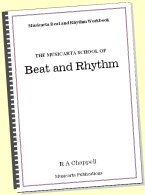
- Volume 1 -

12-BAR PIANO
STYLES WORKBOOK
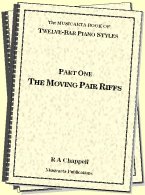
MUSICARTA MODES
WORKBOOK
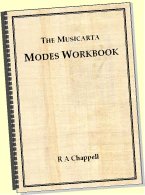
PIANO STYLE
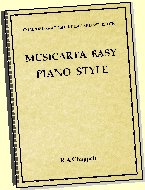
CANON PROJECT
video course
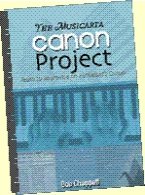
VARIATIONS
video course
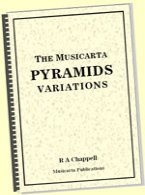

- Piano Solo -
video course

- Piano Solo -


YouTube playlists


